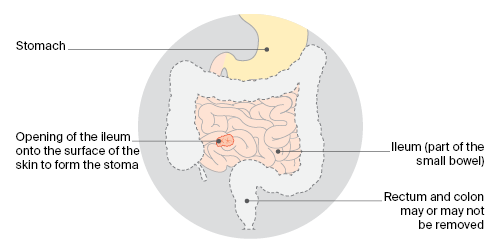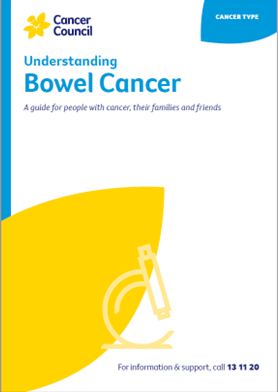- Home
- Bowel cancer
- Managing side effects
- Having a stoma
Having a stoma
A stoma is a surgically created opening in the abdomen that allows faeces (stools or poo) to leave the body. Some of the bowel is then brought out through the opening and stitched onto the skin. There are two types of stoma (colostomy and ileostomy).
Learn more about:
Understanding stomas
A stoma may be temporary (usually formed from a loop of the bowel) or permanent (formed from the end of the bowel). If surgery may result in a stoma, you will usually see a stomal therapy nurse beforehand. They will mark on your abdomen where the stoma will be placed, taking into account your skin folds and your clothing style.
Temporary stoma
This is needed only until the newly joined bowel has healed. A loop of the bowel is brought out through the opening in the abdomen, and then cut and stitched to the skin. This creates 2 openings. You will have another operation, usually after 3–12 months, to close the stoma and rejoin the bowel. This is called a stoma reversal.
Permanent stoma
About 1 in 10 people with rectal cancer need a permanent stoma when the tumour involves the anal sphincter muscles or the sphincter is not strong enough to control the bowel (incontinence). Permanent stomas are not often used for colon cancer.
Appearance
Like the inside of the mouth, a stoma is soft, moist, and red or pink in colour. It may be level with the surrounding skin or slightly raised. The stoma doesn’t have any feeling, but the skin around it does. Stomas vary in size and can change shape after surgery.
Types of bowel stomas
Colostomy
A type of stoma made from the colon.

Ileostomy
A type of stoma made from the ileum.


Stoma bag or appliance

→ READ MORE: How the stoma works
Podcast: Coping with a Cancer Diagnosis
Listen to more of our podcast for people affected by cancer
More resources
A/Prof David A Clark, Senior Colorectal Surgeon, Royal Brisbane and Women’s Hospital, QLD, The University of Queensland and The University of Sydney; Yvette Adams, Consumer; Dr Cameron Bell, Gastroenterologist, Royal North Shore Hospital, NSW; Katie Benton, Advanced Dietitian Cancer Care, Sunshine Coast University Hospital and Queensland Health, QLD; John Clements, Consumer; Dr Fiona Day, Medical Oncologist, Calvary Mater Newcastle, NSW; Alana Fitzgibbon, Clinical Nurse Consultant, GastroIntestinal Cancers, Cancer Services, Royal Hobart Hospital, TAS; Prof Alexander Heriot, Consultant Colorectal Surgeon, Director Cancer Surgery, Peter MacCallum Cancer Centre, and Director, Lower GI Tumour Stream, Victorian Comprehensive Cancer Centre, VIC; Caitriona Nienaber, 13 11 20 Consultant, Cancer Council WA; Dr Kirsten van Gysen, Radiation Oncologist, Nepean Cancer Care Centre, NSW.
View the Cancer Council NSW editorial policy.
View all publications or call 13 11 20 for free printed copies.

